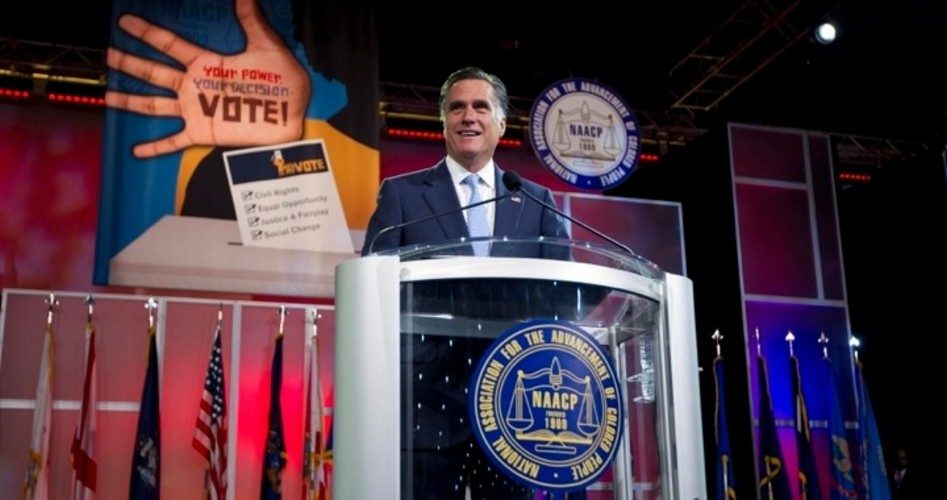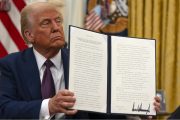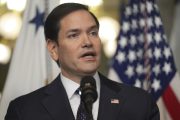
On July 11, Republican presidential nominee Mitt Romney addressed a Texas chapter of the National Association for the Advancement of Colored People (NAACP).
Considering that black Americans — over 90 percent of whom vote Democrat and over 95 percent of whom voted for Barack Obama — are the Democratic Party’s single largest constituency, Romney’s decision to accept the NAACP’s invitation was a daring one.
Yet in spite of the fact that he knew that he would be addressing a room full of people virtually all of whom will be voting for his opponent come November, the former Massachusetts governor for the most part gave a speech that was in keeping with his national campaign message.
Romney was direct: “With 90 percent of African-Americans voting for Democrats, some of you may wonder why a Republican would bother to campaign in the African-American community, and to address the NAACP. Of course, one reason is that I hope to represent all Americans, of every race, creed or sexual orientation, from the poorest to the richest and everyone in between.”
He then began touting his extensive experience in the private sector: “I know what it will take to put people back to work,” Romney told the crowd. “My jobs plan is based on 25 years of success in business.” He then proceeded to delineate its five components.
First, Romney spoke of his energy policy, a policy that consists of approving “the Keystone pipeline” and that will eventually restore “over a million manufacturing jobs” that the United States has lost.
Second, Romney said that he will “open up new markets for American products” — even though he will “clamp down on cheaters like China” that frustrate the goal of “free and fair” trade.
Third, the presidential aspirant promised to “reduce government spending.” He pointed out that “if our goal is to create jobs, we must stop spending over a trillion dollars more than we earn.” To achieve this aim, Romney promised to “eliminate expensive non-essential programs like Obamacare, and … work to reform and save Medicare and Social Security” by way, partially, of “means-testing their benefits.”
Fourth, Romney said that he “will focus on nurturing and developing the skilled workers our economy so desperately needs and the future demands.” He lamented that “too many homes and too many schools are failing to provide our children with the skills and education that are essential for anything other than a minimum-wage job.”
Finally, Romney pledged to “restore economic freedom.” This freedom, according to Romney, has been lost during President Obama’s term, and “entrepreneurs are being crushed by high taxation, burdensome regulation, hostile regulators, excessive healthcare costs, and destructive labor policies.” In contrast, Romney says that he will “work to make America the best place in the world for innovators and entrepreneurs and businesses small and large.”
Obama, Romney insists, in spite of his protestations to the contrary, will not and cannot do any of this. Furthermore, “his record of the last four years proves” this.
Although Romney was booed when he vowed to repeal ObamaCare — the Affordable Health Care Act — he also received applause at various points, and a standing ovation when he completed his speech.
Romney’s presentation to the NAACP was significantly different from John McCain’s in 2008.
According to a Washington Post article from July of 2008, McCain “lavished praise upon,” not just Martin Luther King, Jr., but his rival, Barack Obama.
“Don’t tell him I said this,” McCain began, “but he [Obama] is an impressive fellow in many ways.” In having “inspired a great many Americans,” the senator from Illinois “has achieved a great thing — for himself and for his country” — a feat for which McCain was grateful.
Romney’s speech didn’t lend itself as easily as did McCain’s to the charge of pandering, for Romney spent a considerable amount of time pointing out ugly facts regarding the condition of blacks under the presidency of the first black president.
While the economy is bad for all, Romney correctly observed that “it’s worse for African Americans in almost every way.” He elaborated: “The unemployment rate, the duration of unemployment, average income, and median family wealth are all worse for the black community” than for non-black Americans. Romney added that during the month of June, whereas “the overall unemployment rate remained stuck at 8.2 percent, the unemployment rate for African Americans actually went up, from 13.6 percent to 14.4 percent.”
Romney also remarked that educationally, blacks fare worse than others. “Today, black children are 17 percent of students nationwide — but they are 42 percent of the students in our worst-performing schools.”
Considering that nine out of every 10 blacks vote Democrat, it is doubtful that Romney would have picked up any extra votes from his speech. But given his refusal to deviate from his campaign message of limited government and greater individual freedom, he may have succeeded in eliciting some measure of respect from those conservatives and others who have been distrustful of Romney from the outset of the GOP primary season because of Romney’s many apparent revaluations of his political beliefs, which has often been deemed flip-flopping.
Photo of Mitt Romney at the July 11 NAACP Conference in Houston: AP Images



